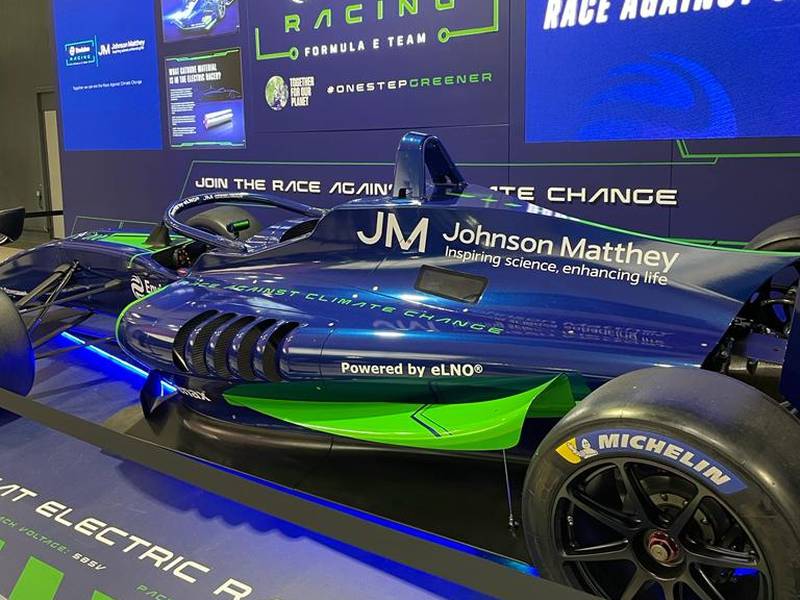Johnson Matthey's exit from EV battery market delivers embarrassing blow to UK industry

Britain’s hopes to take the lead on the electric vehicle battery market were dealt an embarrassing blow when UK chemicals company Johnson Matthey decided to stop developing the technology amid poor returns.
The announcement not only caused Johnson Matthey's shares to slump by as much as 20 per cent on the news, but it came when the company has a prominent presence at the Glasgow Cop26 summit. Its branding had been posted on the side of the world’s first electric two-seater race car produced in conjunction with Envision Virgin Racing on a stand at the heart of the venue.
On display since the start of the two-week event, the Formula E vehicle was conceived to accelerate the transition to a net zero future, making Johnson Matthey's exit from producing the technology behind the car a further embarrassment for UK industry.
With Robert MacLeod, chief executive of the FTSE 100-listed company preparing to step down next year, the company said potential returns from the battery materials unit could not justify the sizeable investments made into the division as it struggled to compete against European companies already producing batteries on a mass scale.
"This decision will allow us to accelerate our investment and focus on more attractive growth areas, especially where we have leadership positions such as in hydrogen technologies, circularity and the decarbonisation of the chemicals value chain," said Mr MacLeod, who will step down from the role in March after eight years at the helm.
While the company initially explored strategic partnerships, it has now committed to pursuing a sale and exit for that arm of the business, which employs about 430 people.
"This decision will allow us to accelerate our investment and focus on more attractive growth areas, especially where we have leadership positions such as in hydrogen technologies, circularity and the decarbonisation of the chemicals value chain," Mr MacLeod added.
The exit is not the kind of news Cop26 organisers are hoping for at a time when Britain, the hosts of the UN climate summit in Glasgow, are struggling to secure consensus from countries across the globe on how to reduce carbon emissions.
The 204-year-old engineering firm, best known for producing catalytic converters for cars, which clean exhaust emissions from petrol and diesel cars, was considered a success story of Britain's transition to green transport with its electric car projects receiving at least £14.4 million in government funding.
Johnson Matthey was also in the midst of a £600 million investment to provide chemical technology for Europe's growing electric vehicle market. This included a new factory in Finland to build as many as 300,000 car batteries a year.
European companies are rushing to invest in the battery sector to help meet a target to get at least 30 million zero-emission cars on roads by 2030. Battery demand is expected to be so strong that production barely will keep pace by the end of the decade, according to UBS Group.
However, the fast pace of battery technology development and the size of competitors in the field caused Johnson Matthey to fall behind on the development and production of its lithium-ion batteries, while supply chain shortages hitting the automotive industry only added to the challenges.
Like larger European rivals Umicore of Belgium and Germany's BASF, JM has bet on growth in cathode materials, the most complex chemical component of an automotive battery, to offset an expected decline in their lucrative businesses supplying catalytic converters for cars.
The decision to exit the market has sounded the alarm for UK industry, as a strong supply of batteries from the UK to seen as a key way to safeguard 90,000 British jobs in the sector that still relies heavily on internal combustion.
While Johnson Matthey will now focus on hydrogen technology and decarbonising chemicals production, an exit from cathodes would tie the company's fate to that of the combustion engine, as it misses out on the electric mobility trend, according to Hargreaves Lansdown analyst Laura Hoy.
"Ultimately the group will be starting over from square one as it looks for ways to change alongside the new greener auto industry," Ms Hoy said.
Shares in the blue-chip company were flat on Friday, hovering around at 2,249 pence at 11am London time, after plunging 20 per cent at one point on Thursday after the company said annual results would be towards the lower end of market expectations.
Previous Story
- UK removes all 7 countries from red list...
- UAE to UK flight bookings surge after Sinopharm...
- UK economy slows sharply in third quarter as...
- Rolls-Royce gets funding to develop mini nuclear reactors
- New York gears up for tourists' return as...
- Countries pledge to quit coal — but the...
- Bill Gates doubts goal of limiting global warming...
- Database firm Clearview AI told to remove photos...